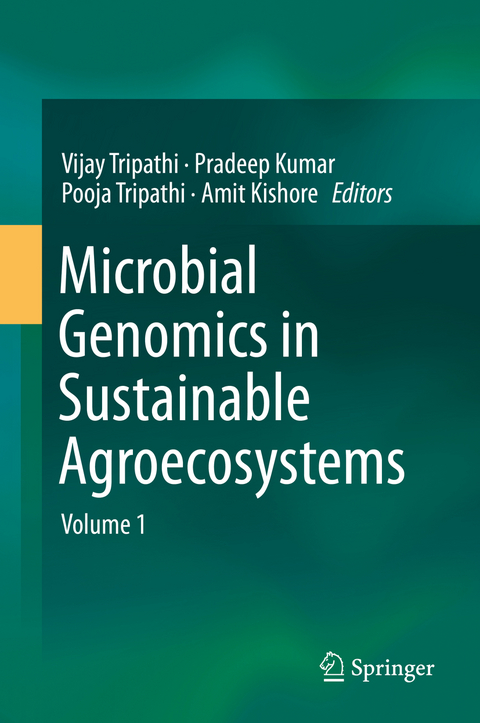
Microbial Genomics in Sustainable Agroecosystems
Springer Verlag, Singapore
978-981-13-8738-8 (ISBN)
This book covers four major areas: 1) Environmental microbial genomics, 2) Microbial genomics in human health, 3) Microbial genomics in crop improvement and plant health protection, and 4) Genome analysis of microbial pathogens. Within these areas, the topics addressed include: microbial genome diversity, evolution, and microbial genome sequencing; bioinformatics and microarray-based genomic technologies; functional genomics of bioremediation of soil and water from organic and inorganic pollutants and carbon management; functional genomics of microbial pathogens and relevant microorganisms; functional genomics of model microorganisms; and applied functional genomics.
Given its scope, the book offers a comprehensive source of information on the latest applications of microorganisms and microbial genomics to enhance the sustainability of agriculture and the environment.
Dr. Vijay Tripathi is currently working as an Assistant Professor at the Department of Molecular and Cellular Engineering, Sam Higginbottom University of Agriculture, Technology and Sciences, Prayagraj, India. He was previously awarded an ARO Post Doctoral Fellowship at the Department of Soil, Water, and Environmental Science, Agricultural Research Organization, Bet Dagan, Israel. He has also received two prestigious postdoctoral fellowships (Indo-Israel Government Fellowship and PBC Outstanding Post Doctoral Fellowship) and worked with Prof Edward Trifonov as a postdoctoral fellow at the Institute of Evolution, University of Haifa, Israel. Dr Tripathi began his research career as a doctoral student at the Center of Bioinformatics, University of Allahabad, India. During his doctoral thesis work he was also awarded a MUIR fellowship and visited the University of Cagliari, Italy. Dr. Pradeep Kumar is currently working as an Assistant Professor at the Department of Forestry, North Eastern Regional Institute of Science and Technology (NERIST), Nirjuli, India. Before joining NERIST, he served as an International Research Professor/Assistant Professor at the Department of Biotechnology, Yeungnam University, South Korea. He was awarded a PBC Outstanding Post Doctoral Fellowship to work for more than three years as a Postdoctoral Researcher at the Department of Biotechnology Engineering, Ben Gurion University of the Negev, Israel. He is the recipient of many best paper presentations and the Narasimhan Award from the Indian Phytopathological Society, India. He has published four books and more than 50 research and review articles in peer-reviewed journals, as well as several book chapters. Dr. Pooja Tripathi is currently working as an Assistant Professor at the Department of Computational Biology & Bioinformatics, JIBB at Sam Higginbottom University of Agriculture, Technology and Sciences, Prayagraj, India. She completed her PhD in Bioinformatics at the University of Allahabad, Prayagraj. She was also awarded the prestigious PBC Outstanding Post Doctoral Fellowship from the Ministry of Higher Education, Israeli Government, to pursue her postdoctoral research at the Department of Plant and Environmental Science, Weizmann Institute of Science, Rehovot, Israel. She also received an ARO Post Doctoral Fellowship and joined the Department of Plant Pathology and Weed Research, Agricultural Research Organization, Bet Dagan, Israel as a postdoctoral fellow. Dr. Amit Kishore is graduated from V.B. Singh Purvanchal University, Jaunpur, India, then after postgraduate and doctoral degree in Botany from Banaras Hindu University, Varanasi, India. He gained his post-doctoral research experience in host-pathogen interaction area from Agricultural Research Organization (ARO), Israel. Currently, Dr. Amit Kishore is working as an Assistant Professor (Botany Department) at Kamla Nehru Post Graduate College, Raebareli, India. He has been credited by several by fellowships and awards like CSIR- NET JRF, CSIR SRF, Best poster presentation and ARO post-doctoral fellowship. Dr. Singh is life member of the Association of Microbiologists of India (AMI) and Biotech Research Society, India (BRSI).
1. Functional genomics and System biology approach in bioremediation of soil and water from organic and inorganic pollutants.- 2. Mycorrhiza and plant disease control.- 3. Mycovirus and the genome of plant fungi pathogen.- 4. Bacterial Pan-genomics.- 5. Phyllosphere and its potential role in sustainable agriculture.- 6. Functional genomics and systems biology approach for understanding Agroecosystems.- 7. Advancements in Microbial Genome Sequencing and Microbial Community Characterization.- 8. Bioinformatics and microarray-based technologies to Viral genome sequence analysis.- 9. Application of whole genome sequencing (WGS) approach against identification of foodborne bacteria.- 10. Functional metagenomics for rhizospheric soil in agricultural systems.- 11. Microbial genomics in carbon management and energy production.- 12. Microbial genome diversity and microbial genome sequencing.- 13. Molecular Techniques for the Identification and Genotyping of Microorganisms.- 14. RNA-guided CRISPR-Cas9 System for Removal of Microbial Pathogens.- 15. Biosorption-cum-bioaccumulation of heavy metals from industrial effluent by brown algae-Deep insight.- 16. Linking microbial genomics to renewable energy production and global carbon management.
| Erscheinungsdatum | 20.11.2019 |
|---|---|
| Zusatzinfo | 27 Illustrations, color; 6 Illustrations, black and white; XIV, 285 p. 33 illus., 27 illus. in color. |
| Verlagsort | Singapore |
| Sprache | englisch |
| Maße | 155 x 235 mm |
| Themenwelt | Naturwissenschaften ► Biologie ► Mikrobiologie / Immunologie |
| Naturwissenschaften ► Biologie ► Ökologie / Naturschutz | |
| Sozialwissenschaften ► Politik / Verwaltung | |
| Schlagworte | Crop improvement • environmental genomics • functional genomics • Human health • microbial genomics |
| ISBN-10 | 981-13-8738-9 / 9811387389 |
| ISBN-13 | 978-981-13-8738-8 / 9789811387388 |
| Zustand | Neuware |
| Haben Sie eine Frage zum Produkt? |
aus dem Bereich


